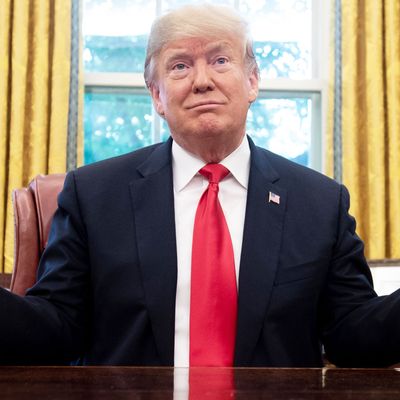
President Trump took a brief respite from his campaign to brand Democrats as an angry mob to campaign on behalf of a violent criminal. In the course of endorsing Greg Gianforte, who slammed a reporter to the ground for having the temerity to ask his stance on the Republican health-care repeal bill, the president regaled a supportive crowd last night with an inside look at his thought process at the time of the crime.
“I was in Rome,” Trump tells the audience, and “I heard he body-slammed a reporter!” At this point the audience cheers. Trump recounts that he initially met the news with concern — not because he had any ethical problem with assaulting a reporter, but because voters might not like it. “I said, ‘Oh, this is terrible, he’s going to lose the election.’” But then, Trump says, he drew upon his deep understanding of the state, and — displaying his professed ability to correctly predict every outcome — quickly realized “‘I know Montana pretty well. I think it might help him.’ And it did!”
Trump’s riff offers some revealing insight into both his own mentality and that of his supporters: They not only view Gianforte’s assault as tolerable, a price they’re willing to pay to keep a House seat in Republican hands, but as praiseworthy. Trump is telling Republicans everywhere that they can help gain power and esteem through violence against journalists. His crowd’s enthusiasm vindicates him.
It also gives a useful perspective on the apparent murder of Saudi journalist Jamal Khashoggi. Of course, the amount of violence in the two incidents is very different. But one similarity here is that both attacks represent the analogous thresholds of acceptable violence against journalists in their respective societies. In the U.S., the edge of the boundary of political acceptability is a body slam. In an illiberal kingdom like Saudi Arabia, it takes much more, like torture and murder. In both cases, the event extends the horizon of what can be imagined and tolerated at the moment.
In both cases, the assailants immediately denied their guilt. Gianforte’s spokesman offered up a fantastical account of the assault, in which the slender Jacobs, a “liberal reporter,” “aggressively shoved a recorder in Greg’s face.” Terrified by this attack, “Greg then attempted to grab the phone,” at which point the journalist escalated his attack: “Jacobs grabbed Greg’s wrist, and spun away from Greg, pushing them both to the ground.” Also in both instances, the lie was undermined by a third party that possessed audio of the episode. (In Gianforte’s case, the local Fox News team witnessed and had audiotape of the entire attack.)
It’s also worth considering what Trump’s contemporaneous account of his own views of Gianforte last year tell us about his thinking about Khashoggi today. In 2017, after all, Trump did not praise Gianforte for attacking a reporter. House Speaker Paul Ryan expressed his public disappointment at the attack and demanded an apology, and Trump’s no-comment allowed Ryan’s statement to represent the party line.
Today, Trump officially disapproves of the Khashoggi murder. But everything about his body language indicates his disapproval is purely pro forma. Yet he repeatedly indicates the factors that actually weigh on his mind: the Saudis are valuable customers who have treated him well. His concern is not the murder but the world’s response to the murder: “This one has caught the imagination of the world, unfortunately,” he lamented the other day.
Meanwhile, Trump is helping the Saudis craft a cover story. The alliance will go on, and the unfortunate wave of moral revulsion will be forgotten. In a year from now or so, Trump and Mohammed bin Salman will probably have a good laugh over it.






























